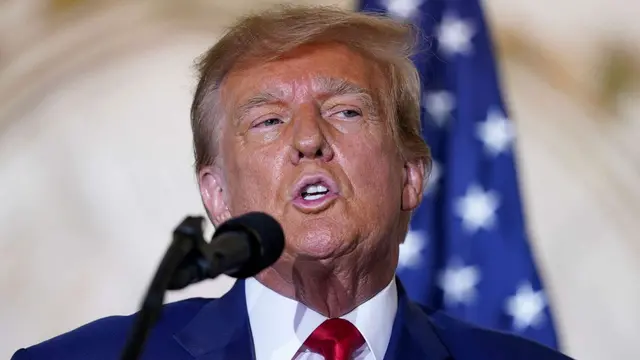Former President Donald Trump's town hall on CNN Wednesday featured no shortage of theatrics, from calling moderator Kaitlin Collins "nasty" to sparking laughs from a supportive audience with a jab against E. Jean Carroll, the author who accused him of rape and won a civil case in which a jury found him liable for battery and defamation.
But during the 70-minute forum, Trump also faced policy questions he either dodged or answered head-on, potentially revealing contours of a possible second Trump administration.
Here are five areas where Trump took new policy positions -- or evaded.
Abortion
Trump hailed the Supreme Court overruling Roe v. Wade a "great victory," taking credit because he nominated three of the conservative justices who voted to do so.
When it comes to what's next, though, Trump was evasive.
"President Trump is going to make a determination what he thinks is great for the country and what is fair for the country," Trump said when Collins pressed him on his position on some kind of national ban.
"I'm looking at a solution that's going to work."
Of last year's Supreme Court ruling, Trump said, "You know that they wanted to bring it back to the states but that was probably the least important part of that victory," but he didn't explicitly say that's what he'd support over federal legislation.
The comments served as a microcosm for the GOP's broader struggles with abortion after Democratic fury over last year's Supreme Court decision helped turn what was supposed to be a red wave midterm election into one that saw Democrats expand their Senate majority and minimize their House losses.
Trump has struggled to find his footing on the issue, sparking backlash from typically supportive evangelical and anti-abortion groups after blaming Republicans' underwhelming midterm results on candidates who supported stringent restrictions on the procedure.
The former president met last week with Susan B. Anthony Pro-Life America, a powerful anti-abortion advocacy group in the U.S., after which Marjorie Dannenfelser, the group's president, called the meeting "terrific."
Debt ceiling
Trump made waves with his comments on the debt ceiling, seeming to put a historic and potentially calamitous default firmly on the table if Republicans don't succeed in pushing for spending cuts.
"I say to the Republicans out there -- congressmen, senators -- if they don’t give you massive cuts, you're going to have to do a default," he said.
The remarks come as Republicans and Democrats negotiate over how to lift the limit on how much the government can borrow to pay its existing obligations.
Republicans are saying they'd only vote for an increase if President Joe Biden and congressional Democrats agree to significant spending cuts, while Democrats say a clean debt ceiling increase should pass Congress, warning the threat of default is too great to be negotiated over.
The talks were jumpstarted after Treasury Secretary Janet Yellen said the government could run out of money to pay its expenses as early as June 1.
Trump, when pressed, doubled down on saying he would endorse default if negotiations reach a stalemate.
"We might as well do it now because you'll do it later," he said.
Ukraine
Trump claimed he would be able to bring a halt to the fighting in Ukraine but declined to come down firmly on Kyiv's side in the fight against Russia's invasion.
He boasted that if he were president, he could end the war in 24 hours but did not detail what he wanted an end to look like, dodging on whether he wanted Ukraine or Russia to win.
"I don't think in terms of winning and losing," he said. "I think in terms of getting it settled so we stop killing all these people."
The comments followed Trump's trend of being softer on Russia than many other Republicans.
During his administration, he said he believed Russian President Vladimir Putin's assertion that Moscow didn't interfere in the 2016 election -- a stance at odds with the CIA's own findings. And Wednesday, he declined to call Putin a war criminal over the invasion of Ukraine, which has seen hundreds of civilians killed, including many children.
"If you say he’s a war criminal, it will be a lot tougher to get a deal to to get this thing stopped," he said.
A possible return of family separations at the border
Trump sparked international backlash when he instituted a policy in 2018 that separated families at the border, ultimately rescinding the rule amid the outcry.
But on Wednesday, Trump admitted during the town hall that while the policy "sounds harsh," he wouldn't take it off the table.
"Well, when you have that policy, people don't come," he said. "If a family hears that they're going to be separated, they love their family, they don't come."
Pardons for insurrectionists
Trump, who is accused of trying to overturn the 2020 election, repeated false claims that the voting was marred by widespread fraud, but he broke new ground on how he'd handle those convicted and imprisoned over taking part in the Jan. 6, 2021, insurrection.
"I am inclined to pardon many of them," Trump told Collins. "I can't say for every single one because a couple of them, probably, they got out of control."
Trump did not delineate what charge or activity would be considered too severe to not qualify for a pardon, though the comments mark the first time that Trump has said he would consider freeing the lion's share of the over 900 people who have been criminally charged over their involvement in or planning of the riot.
(ABC NEWS)
 简体中文
简体中文

